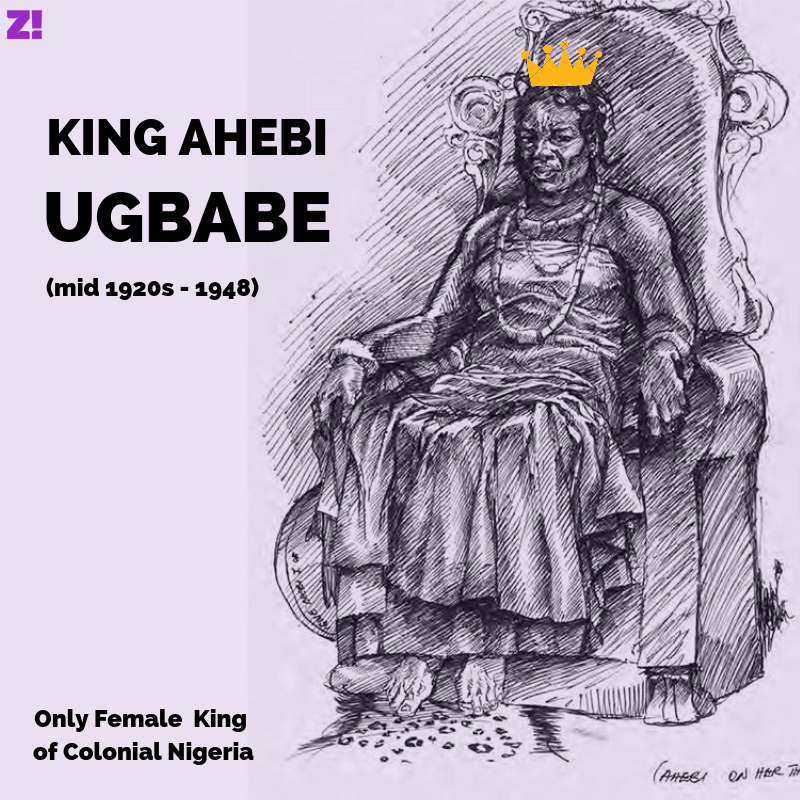
It’s no news that a lot of our history is lost. Especially stories of women like Ahebi Ugbabe whose stories get buried so deep in the trenches of our history, even if you are a historian I bet you had to Google her name when you started reading this article. But even if you’ve never picked up a history book in your life, you’d know Lord Luggard, because colonizer.

Those who know Ahebi Ugabe know her as the first female colonial king in Nigeria which at that time and even now is a big fucking deal. I mean you know the Alaafin of Oyo and the new wife he picks every year. But we bet you can’t name a single prominent female monarch. And that’s only because there are none.

You might find a female ruler in a town or village here or there but you won’t find any of them making these types of lists. And when you google female Nigerian kings you get posts like this – ‘Which Nigerian king has the prettiest wife’. Revolutionary stuff.
If Ahebi Ugbabe’s reign wasn’t in 1920 but in 2018, you can bet she’d make that list. Get why she’s a big deal now?

Beyond being the only female king in colonial Nigeria, Ahebu Ugbabe’s life is super fascinating. Like the stuff Nollywood movies are made of. But no they’ll rather give us ‘Beyonce Meets Rihanna’ parts 3&4.
She was the only female king to reign in colonial Nigeria.

She was the king of Enugu-Ezike from the mid-1920s till her death in 1948. Before her reign, no one ever thought a woman could become king. But she clearly wasn’t having any of that nonsense.
Before she was king, she was a sex worker. And pretty great at it.

She wasn’t just any kind of sex worker she was a cultured one. So the story goes like this. She was supposed to be married off to a female deity, to atone for her father’s sins. Ahebi was like ‘yeah, I’m not having that’, ran away, became a prostitute and learned to speak three new languages including English. She also used her position as a sex worker to make connections with very important people who helped facilitate her becoming king.
She began her reign just a few months after returning from exile.

Imagine being exiled from home for years, coming back and rising through the ranks to become king in months. She just waltzed into town like ‘look I’m your captain now’. A couple of things facilitated it though, first she was the only person able to converse with the British who had already come to farabale in land that was not their own. She was also kind of the person to lead the British into her hometown. Homegirl had had enough of her exile and was ready to return home by hook or by crook.
She tried to introduce her own masquerade, which was apparently an abominable thing for a woman to do.

Sis just didn’t understand why it was a taboo for women to control masquerades. Like hello, I’m king, what do you mean I don’t get my own masquerade? Even though she got quite the blowback for it she stood her ground because she believed in equality of the sexes. She went as far as showing up at a festival in her own masquerade mask. The woman just wouldn’t take no for an answer. I stan a progressive queen.
She had multiple wives. Because why not?

Many of which had run away from abusive husbands. They were allowed to come and go as they pleased and do whatever they want. Which included having sex with whoever they wanted. And if they had kids the kids bore Ahebi’s name.
She performed her own burial rites before she died.

The masquerade debacle led her to lose the support and respect of many of her constituents but she managed to remain in power till her death. Not willing to risk any man messing it up, she performed her own burial rites just before she died.
Can we get a Nollywood movie on her already?

Stories of this extraordinary woman could fill a book. That’s why it’s pretty great that one exists. Nwando Achebe’s book – The Female King of Colonial Nigeria is a must read. Please don’t go and download it illegally. You can buy it here and support remarkable Nigerian women.




